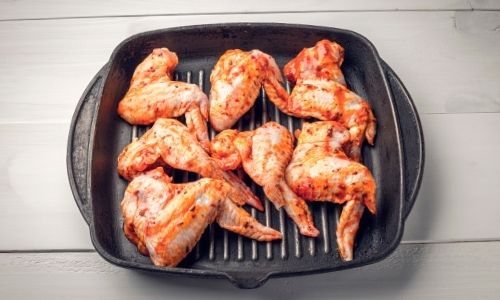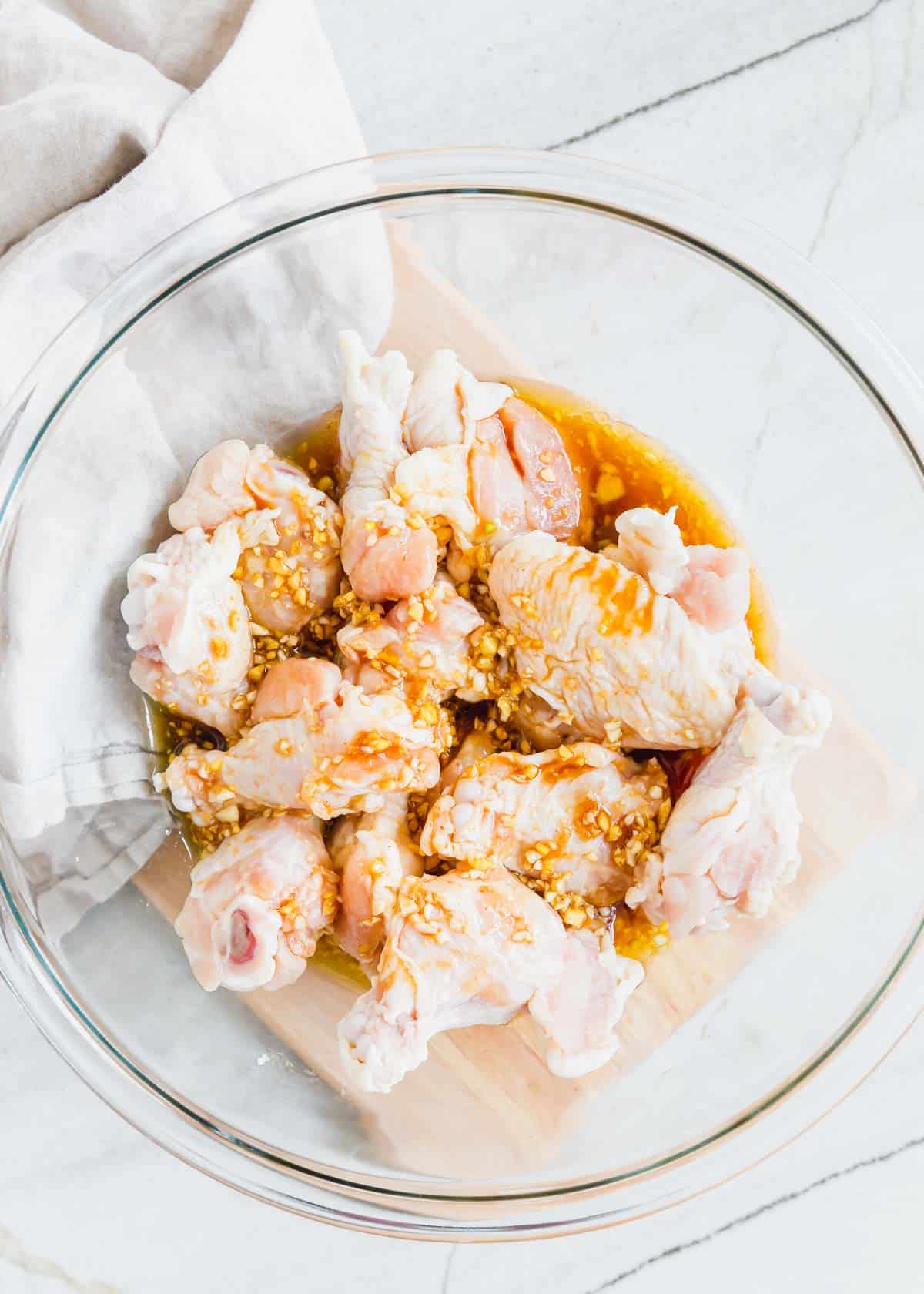Marinating chicken wings is a popular technique used by many home cooks and professional chefs alike to infuse flavor and enhance the texture of this beloved appetizer. But is marinating wings really necessary, or simply an optional extra step? In this article, we’ll examine the pros and cons of marinating chicken wings to help you decide if it’s worth the effort for your next wing night.
What is Marinating and How Does it Work?
Marinating involves soaking meat or vegetables in a seasoned liquid mixture before cooking The marinade usually contains an acid, oil, and flavorings like herbs, spices, sauces, etc
When chicken wings are soaked in a marinade a few important things happen
-
Acid Tenderizes: Acidic ingredients like vinegar, lemon juice, or yogurt help break down tough proteins in the meat through a process called denaturation. This makes the wings more tender and easier to bite into.
-
Flavors Infuse: The marinade allows flavors from spices, herbs, etc. to penetrate deep into the meat. This can amplify and build more complex flavors compared to just seasoning the outside.
-
Moisture Retained: Oil helps coat the exterior of the wings to seal in moisture and prevent them from drying out during cooking.
So in short, marinating makes the wings more moist, tender, and flavorful compared to unmarinated wings. But it does take some extra time and effort.
The Case for Marinating Chicken Wings
Here are some of the biggest benefits of taking the extra time to marinate wings:
More Tender and Juicy Wings
The acid in the marinade breaks down tough proteins and connective tissue. This makes the meat more tender and easier to bite through. The oil also helps retain moisture, keeping the wings deliciously juicy both on the inside and out.
Bolder, More Complex Flavors
Marinating allows you to infuse herbs, spices, sauces, etc. deep into the meat, not just coating the outside. This builds much more robust and multi-layered flavors compared to dry rubs or sauces alone.
Protection During Cooking
The oil and sugars in a marinade form a protective seal around the wings as they cook. This prevents the exterior from drying out too quickly or burning, especially when grilling or broiling wings at high heat.
Shorter Cook Times
Since the acid helps breakdown proteins, marinated wings don’t need to cook as long to reach safe internal temperatures. This makes them quicker and easier to cook.
Consistent Flavor Distribution
Marinating ensures even penetration and distribution of flavors in every bite. Unmarinated wings can end up with inconsistent seasoning if you just sprinkle on a dry rub.
More Customizable Flavors
You can really play around with global flavor combos in marinades, like jerk, satay, tandoori, etc. It’s an easy way to put your own spin on wings.
The Case Against Marinating Wings
However, marinating wings does come with a few drawbacks:
It’s Time Consuming
You need to allow at least 2 hours for the marinade to properly penetrate the meat, but ideally 4-12 hours if you can plan ahead. This takes more forethought and limits spontaneous wing nights.
Can Make Wings Mushy
Too much acid or marinating time can start to break down the proteins too much, making the wings mushy or stringy in texture.
Needs More Precautions
You have to be careful to prevent cross-contamination when working with raw marinated chicken. And the used marinade should always be discarded.
Alters the Original Flavor
Some marinades can overpower the innate chicken flavor, so you lose the essence of the wings. This can be avoided with balanced, complementary flavors.
Doesn’t Work Well for All Cooking Methods
Marinades work best for grilling, broiling, roasting, or baking wings. Deep fried or air fried wings won’t benefit as much since the meat isn’t exposed.
Extra Bowl to Wash
Marinating does create an extra bowl, container, or plastic bag to clean up afterwards, adding to the cleanup time.
How Long to Marinate Chicken Wings
If you do opt to marinate your wings, how long should they soak? Here are some general timelines to follow:
-
Minimum Time: At least 2 hours for partial flavor and texture improvement.
-
Ideal Time: 4-12 hours allows the marinade to really penetrate and do its job.
-
Maximum Time: 24 hours max before the acid degrades the texture.
Make sure wings are always marinated in the fridge, not on the counter. For best results, put the wings in a sealed plastic bag or container with the marinade to maximize coverage. Flip the bag or stir periodically for even exposure.
Tips for the Best Marinated Chicken Wings
If you want to get the most out of marinating your wings, keep these tips in mind:
-
Pat Wings Dry – Before cooking, pat the wings with paper towels to remove excess marinade. This promotes crisping of the skin.
-
Reduce Acidity – If wings get mushy, use less acidic ingredients in your marinade like yogurt or fruit juice instead of vinegar.
-
Remove Skin – Skin acts as a barrier to marinade penetration. Removing it allows faster infusion.
-
Double Marinade – Marinate uncooked wings in one flavor, then quickly dip cooked wings in a second marinade to layer flavors.
-
Bake Then Grill – Marinate, bake to cook through, then grill to sear for nice char. Best of both worlds!
-
Toss in Sauce – After cooking, toss marinated wings with any remaining marinade, glaze, or sauce to coat.
Frequently Asked Questions
Can you marinate frozen chicken wings?
It’s best to thaw wings before marinating. Frozen wings won’t absorb flavors as well.
What’s the best marinade container?
Use non-reactive materials like glass, plastic, or stainless steel (not aluminum). Resealable bags work great.
Can you reuse leftover marinade?
Never reuse marinade that touched raw wings due to bacteria risk. Boil then use as sauce.
Should you remove skin before marinating wings?
Skin can be left on for crisper wings or removed for better marinade absorption, personal preference.
What are good marinade flavor combos?
Popular options are lemon-herb, garlic parmesan, jerk, honey sriracha, soy-ginger, salsa, curry-yogurt, etc. Get creative!
The Final Verdict
Marinating chicken wings requires more time and planning compared to dry rubs or sauces alone. However, the benefits of more tender, juicy, and flavorful wings are hard to beat.
If you have at least 2-4 hours to let the wings soak, the extra effort is worthwhile. But marinating isn’t strictly necessary. Plain or dry rubbed wings can still be delicious with the right cooking method and sauce pairing.
Test out marinated and unmarinated wings to decide which process you prefer for your ideal texture and flavors. Either way, chicken wings cooked to crispy, saucy perfection will always be a crowd-pleasing appetizer!

Why Use A Marinade For Chicken Wings?
Marinades are a great option for both tenderizing and adding flavor to any meat not just chicken wings. We cover all the options in our informative guide to marinating post.
Typically, it’s an important step for tougher cuts of meat but it’s still a delicious and simple way to improve the taste of anything you want to cook, even tempeh and tofu.
How To Bake Marinated Chicken Wings
Once the wings have sufficiently marinated and soaked up all that delicious flavor, it’s time to bake them off.
Preheat an oven to 400°F. Set a wire rack on top of a large heavy duty baking sheet and transfer the wings from the marinade to the wire rack. Arrange them in an even layer so they’re not touching each other.
Bake for 40-50 minutes, flipping halfway through and basting with the extra leftover marinade a few times throughout the cooking process.
The chicken wings are fully cooked when the internal temperature reaches 165°F. They can be broiled during the last couple of minutes to get the skin nicely golden brown and crisp.
Alternatively, cook the marinated wings in the air fryer or make these Ninja Foodi chicken wings if you have their multi-cooker appliance.
For a more hands off recipe, try these slow cooker chicken wings.

